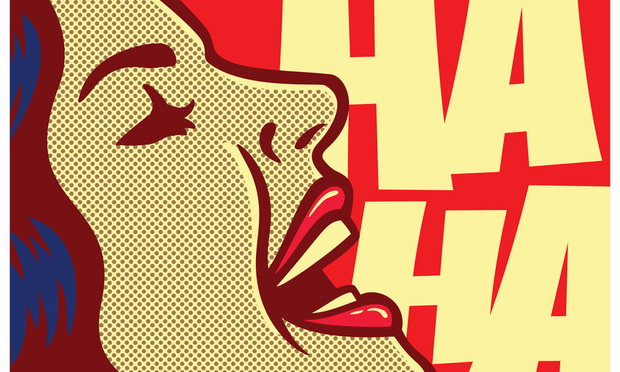If You're a Funny Woman in the Workplace, the Joke's on You
Even if a woman is fabulously funny and making the work environment more enjoyable, research shows that it cuts against her.
February 28, 2019 at 03:00 PM
4 minute read

To all you aspiring Mrs. Maisels out there, I've got bad news: Don't try to be funny. Certainly not in the workplace. Because if you tell jokes or deploy humor in a business setting, you will lose credibility, jeopardize your career and fall flat on your face.
That sums up the study from researchers at the University of Arizona and the University of Colorado Boulder who analyzed reactions to the use of humor by male and female leaders. More than 200 participants watched videos of a manager making a sales pitch in which a male or female manager either used humor or played it straight.
The upshot: Funny men got a boost, while funny women got shafted.
 Everyone loves humor, so why the difference? You guessed it: It all has to do with gender stereotypes. The study says that when men deploy humor, it enhances their aura of rationality and logic. But when women do so, they're perceived as disruptive, reinforcing the notion that women are less dedicated to work.
Everyone loves humor, so why the difference? You guessed it: It all has to do with gender stereotypes. The study says that when men deploy humor, it enhances their aura of rationality and logic. But when women do so, they're perceived as disruptive, reinforcing the notion that women are less dedicated to work.
It does seem harder for women to pull off comedy, but here's what's frustrating: “Even when women successfully express humor, they experience a reduction in status perceptions, performance evaluations, and assessments of leadership capability,” according to the study.
That means even if a woman is fabulously funny and making the work environment more enjoyable, not only will she not be rewarded, she'll be regarded as a wack job.
The only safe way for a woman to conduct herself at work, it seems, is to play it straight and serious. Except you know what will happen next. She'll be called a humorless bitch.
Once again, women just can't win.
But I can't accept that women have to be sourpusses at work. That can't be healthy for anyone. So I asked Jonathan Evans, one of the study's authors, whether women can use a different form of humor, like a wry remark, without paying a penalty.
To my relief, Evans thought women employing dry humor might be more palatable, although he stresses this is anecdotal. “It is possible that more casual, impromptu humor in conversation is evaluated differently than the formal, prepared presentation format used for our study,” he explains. “We thought that dry humor is more easily incorporated into casual conversation than a presentation.”
Another possible exception to the rule that women can't be funny: Older women with a track record of accomplishments. Evans says that this group's use of humor might be more acceptable because these women have established themselves and are thus perceived as “more agentic,” or full of agency.
Frankly, I'm not sure these exceptions are making me feel better. Basically, it means women are allowed the privilege of being funny only if they're not too direct or if they've proven themselves. To me, the better course is for women not to give a damn. While it might be true that funny women don't get the respect that funny men do, so what? Do we need to add another “don't” to our list?
I wonder if this kind of information is helping women. Or is it just making women more self-conscious than we already are?
“That's a reaction I've heard from some people when I've told them about these results,” says Evans. “The most I can say is that our data suggests the existence of this undesired dynamic in this particular circumstance. “
Maybe so. But I'm not amused.
Contact Vivia Chen at [email protected]. On Twitter: @lawcareerist.
This content has been archived. It is available through our partners, LexisNexis® and Bloomberg Law.
To view this content, please continue to their sites.
Not a Lexis Subscriber?
Subscribe Now
Not a Bloomberg Law Subscriber?
Subscribe Now
NOT FOR REPRINT
© 2025 ALM Global, LLC, All Rights Reserved. Request academic re-use from www.copyright.com. All other uses, submit a request to [email protected]. For more information visit Asset & Logo Licensing.
You Might Like
View All

Change Is Coming With the New Trump Era. For Big Law, Change Is Already Here
6 minute read

Trending Stories
- 1Gunderson Dettmer Opens Atlanta Office With 3 Partners From Morris Manning
- 2Decision of the Day: Court Holds Accident with Post Driver Was 'Bizarre Occurrence,' Dismisses Action Brought Under Labor Law §240
- 3Judge Recommends Disbarment for Attorney Who Plotted to Hack Judge's Email, Phone
- 4Two Wilkinson Stekloff Associates Among Victims of DC Plane Crash
- 5Two More Victims Alleged in New Sean Combs Sex Trafficking Indictment
Who Got The Work
J. Brugh Lower of Gibbons has entered an appearance for industrial equipment supplier Devco Corporation in a pending trademark infringement lawsuit. The suit, accusing the defendant of selling knock-off Graco products, was filed Dec. 18 in New Jersey District Court by Rivkin Radler on behalf of Graco Inc. and Graco Minnesota. The case, assigned to U.S. District Judge Zahid N. Quraishi, is 3:24-cv-11294, Graco Inc. et al v. Devco Corporation.
Who Got The Work
Rebecca Maller-Stein and Kent A. Yalowitz of Arnold & Porter Kaye Scholer have entered their appearances for Hanaco Venture Capital and its executives, Lior Prosor and David Frankel, in a pending securities lawsuit. The action, filed on Dec. 24 in New York Southern District Court by Zell, Aron & Co. on behalf of Goldeneye Advisors, accuses the defendants of negligently and fraudulently managing the plaintiff's $1 million investment. The case, assigned to U.S. District Judge Vernon S. Broderick, is 1:24-cv-09918, Goldeneye Advisors, LLC v. Hanaco Venture Capital, Ltd. et al.
Who Got The Work
Attorneys from A&O Shearman has stepped in as defense counsel for Toronto-Dominion Bank and other defendants in a pending securities class action. The suit, filed Dec. 11 in New York Southern District Court by Bleichmar Fonti & Auld, accuses the defendants of concealing the bank's 'pervasive' deficiencies in regards to its compliance with the Bank Secrecy Act and the quality of its anti-money laundering controls. The case, assigned to U.S. District Judge Arun Subramanian, is 1:24-cv-09445, Gonzalez v. The Toronto-Dominion Bank et al.
Who Got The Work
Crown Castle International, a Pennsylvania company providing shared communications infrastructure, has turned to Luke D. Wolf of Gordon Rees Scully Mansukhani to fend off a pending breach-of-contract lawsuit. The court action, filed Nov. 25 in Michigan Eastern District Court by Hooper Hathaway PC on behalf of The Town Residences LLC, accuses Crown Castle of failing to transfer approximately $30,000 in utility payments from T-Mobile in breach of a roof-top lease and assignment agreement. The case, assigned to U.S. District Judge Susan K. Declercq, is 2:24-cv-13131, The Town Residences LLC v. T-Mobile US, Inc. et al.
Who Got The Work
Wilfred P. Coronato and Daniel M. Schwartz of McCarter & English have stepped in as defense counsel to Electrolux Home Products Inc. in a pending product liability lawsuit. The court action, filed Nov. 26 in New York Eastern District Court by Poulos Lopiccolo PC and Nagel Rice LLP on behalf of David Stern, alleges that the defendant's refrigerators’ drawers and shelving repeatedly break and fall apart within months after purchase. The case, assigned to U.S. District Judge Joan M. Azrack, is 2:24-cv-08204, Stern v. Electrolux Home Products, Inc.
Featured Firms
Law Offices of Gary Martin Hays & Associates, P.C.
(470) 294-1674
Law Offices of Mark E. Salomone
(857) 444-6468
Smith & Hassler
(713) 739-1250










